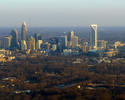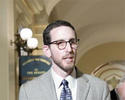If an early April panel discussion (virtual) of the Manhattan Institute on “Planning the Post-Covid City” was surprisingly progressive, maybe it was because this talk of revolution in the streets was about reallocating little more than parking spaces. Yet that much upheaval is basic, these panelists agreed, to renewal of New York’s pre-pandemic glory. read more »
A Very Curious Thing is Happening in Austin, Texas
When the nation’s CEOs were being polled about state business climates earlier this year for Chief Executive’s annual rankings of the “Best and Worst States for Business,” there was a lot of concern about Austin, Texas, among the magazine’s conservative-leaning readership. read more »
- Login to post comments
March 2021 Transit Ridership Down 59%
Public transit carried 33 percent fewer riders in March 2021 than in March 2020 and 59 percent fewer than in March 2019, according to data published yesterday by the Federal Transit Administration. read more »
The Geography of COVID-19
The ongoing pandemic is reshaping the geography of our planet, helping some areas and hurting others. In the West, the clear winners have been the sprawling suburbs and exurbs, while dense cores have been dealt a powerful blow. The pandemic also has accelerated class differences and inequality, with poor and working class people around the world paying the dearest price. These conclusions are based on data we have repeatedly updated. read more »
America’s Post-Pandemic Geography
Even as vaccination increases across the United States and an end to the tragedy of the Covid-19 pandemic seems in sight, the economic, fiscal, political, and geographic fallout from the virus cannot be overstated: a massive public health crisis that left more than half a million Americans dead, an economic catastrophe that caused record unemployment and small-business closures, and a seismic political event that surely helped tip the presidential election. The pandemic will pass, and the economy will revive, as it is already doing. read more »
- Login to post comments
Vuca Waymo
I’m prone to going down YouTube rabbit holes that take me to unexpected places. I recently eavesdropped on a Zoom conference where a woman in rural Idaho was strategizing on the global dairy trade. Turns out Mormon farmers are locked in a dog-eat-dog international competition over bulk milk commodities and specialty cheeses. New Zealand is their prime nemesis. Who knew? read more »
- Login to post comments
America's Dispersing Metros: The 2020 Population Estimates
The big story among the nation’s major metropolitan areas (the now 51 of 55 over one million with more than one county) over the past decade has been the persistence of urban core out-migration and suburban in-migration.
The Nearly 5,000,000 Suburban Net Domestic Migration Advantage read more »
- Login to post comments
The Idaho Boom
Idaho has recently been the fastest growing state in the country, with population growth of 2.1% last year. Of course it is easy to get high percentages on a small base, but the Idaho growth story is real. From 2018 to 2019, the most recent available data, Coeur d’Alene ranked 7th among all metro areas in population growth, Boise ranked 8th, and Idaho Falls ranked 18th. read more »
Senator Scott Wiener (D) Introduces Bill That Would Further Increase Energy Costs for Californians
California Senator Wiener has taken Governor Newsom’s recent Executive order to ban the sale of gas-powered vehicles and hydraulic fracturing one step further with his introduction of SB 467 to obliterate the California economy. The bill is so broad and ambiguous that the results of its passage would lead to a total production ban in California and increase energy costs upon those that can least afford it. read more »
- Login to post comments
Yeomanry's Global Decline
For much of the last part of the 20th Century, the world’s middle class was ascendant, expanding and, in most countries, firmly in control of national politics and culture. Yet in more recent decades, this process has been slowly reversed, in the United States as well as in Europe and, increasingly, East Asia. read more »
- Login to post comments






















